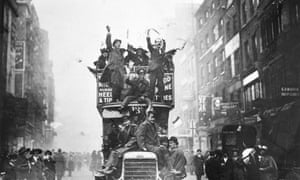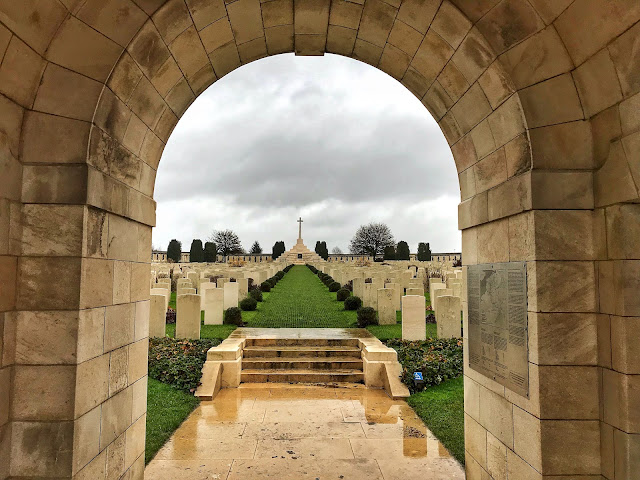''Not in Vain' was the Day's Refrain': Thanksgiving for the Armistice

As the guns fell silent on the Western Front on 11th November 1918, it was sound that characterised the Armistice on the home front. People thronged the streets, with many calling for impromptu church services and ceremonies, while bells rang out across the nation in jubilation.
The word that accompanied them was 'thanksgiving'. Not quite celebration at victory, but also not as solemn as the remembrance of today. This is perhaps because it was too soon to forget. The loss was fresh and ongoing; many would continue to die from the effects of war for a while yet to come. A week later The Times would mention 'remembrance of the conflict', but its main focus, like that of wider Britain, remained on thanksgiving.
The St Paul's order of service was published in the newspapers, which means it has luckily been preserved. The opening hymn was 'Praise, My Soul, the King of Heaven', taken from Psalm 103. The repeated lyrics in the chorus of 'Praise Him!' clearly place the thanksgiving for the Armistice with God. Throughout the war, there had been much talk that God was on the Allies' side and that He would ensure Victory. The Armistice was accordingly seen as proof of this, and as the hymn says, he 'rescues us from all our foes'. What was not mentioned at this time was that the Germans had believed the same, of 'Gott mit uns' [God with us].
The same sentiments were expressed in Psalm 46 which followed - 'God is our refuge and strength, a very present help in trouble' - and in the prayers for the 'Thanksgiving for Deliverance from our Enemies'. However, there were also triumphant notes with the prayers for the 'Triumph of our Cause' and in the singing of 'For all the Saints'. This was a particularly poignant choice of hymn, as it had been set to music by Vaughan Williams, who, at the time of the Armistice, was serving as a Lieutenant in the Royal Garrison Artillery in France. The hymn was also seasonal, with November being the month of All Saints' Day, and had lyrics which could be directly applied to the circumstances of war. With thoughts firmly with those loved ones at war, lines such as 'Thou, Lord, their Captain in the well fought fight' and 'Soon, soon to faithful warriors come their rest' would have felt very fitting for the first day of peace.
Cuthbertson records the impact of this last hymn on the cathedral was profound and that 'the suppressed sobs of some of those who have given their dearest and best in the struggle ... gave way to a shout of triumph as choir and people sang the final verses'. It was here that he argued ''Not in vain' was the day's refrain'. There was a distinct and inevitable sadness to the day, but this formed part of the larger sentiment of thanksgiving for peace and victory.
In pre-war Britain it would have been near unthinkable that the head of the Church of England should attend a Free Church service, but as examined by Stuart Bell, the late war years and immediate aftermath was a period in which 'church re-union' between the Anglicans and Nonconformists 'became an increasingly important topic'. This was not to last, but the ecumenism necessitated by the conditions of war had brought the denominations together in a number of ways, including 'on matters of social concern'.
Bell also notes that much of this inter-denominational worship took place 'in the civic space', such as with the Albert Hall. This is perhaps important. The role of the Monarch is a complex one. It inextricably links the figureheads of the State, the Armed Forces and the Church. It can therefore be seen that by attending the Free Churches' thanksgiving, George V was present in tribute to Nonconformist servicemen and civilians involved in the war effort, but by attending away from a religious space, conflict could be avoided with his Anglican position.
With all the talk of Church re-union at the time, it is remarkable quite how similar this service was to the one at St Paul's. 'Praise, My Soul, the King of Heaven' and 'For all the Saints' were both sung. The readings were also the same, taken from Isaiah 40 (1-11), which begins 'Comfort ye my people, saith your God'. Cuthbertson has found that this passage was widely read in the days that followed the Armistice, as it connects 'suffering and recovery'; ideal for a nation coming to grips with, and beginning to move on from, the horror of war.
The Albert Hall service then closed with a final hymn: 'God save our Native Land', before the singing of the National Anthem to the same tune. For an Armistice service this is an interesting choice, as while its tones of patriotism and triumph are clear to see, the hymn was originally written by Siegfried A Mahlmann in 1815 as 'Gott Segne Sachsenland'. It was German, and the 'Native Land' it referred to was not victorious Britain but their defeated enemy. Until 1918, this had also been the anthem of Saxony. However, it had been in British usage since its translation in 1836 and the German version was probably not well known among the Albert Hall's congregation.
The hymn was nonetheless triumphant and optimistic, in line with the celebrations of the 'great and glorious victory' which were preached across Britain in that week. The Church of England published 'Forms of Thanksgiving' and suggested orders of service for use in churches around the country for 17th November, the first Sunday of peace. These were widely circulated in the newspapers to disseminate the suggested teachings, which gave thanks for 'the faithfulness, bravery, and self-sacrifice' of war, praised the 'memory and high example of the men who have died', and which turned the Christian focus to be 'refreshed with the multitude of peace'.
As one hundred years later we, quite rightly, focus on remembrance, it is important too to look back to what those who experienced the Armistice felt of it. Of course, thanksgiving, however expressed, was not purely a religious sentiment. Those who thought little of God also gave their thanks for peace, and for the reassurance that all their sacrifice in those four years of war had not been in vain. Such thoughts, however, are less well-expressed in the written evidence although such relief can be identified in the street celebrations immediately after the Armistice and in the charitable and commemorative efforts which followed in the first years of peace.
And as, in the words of Laurence Binyon, which have been repeated across Britain today: "We will remember them".
Kathryn
References
The Times
The Daily Mail
Stuart Bell, Faith in Conflict: The Impact of the Great War on the Faith of the People of Britain, (Solihull: Helion and Company, 2017).
Guy Cuthbertson, Peace at Last: A Portrait of Armistice Day, 11 November 1918, (Yale University Press, 2018).



No comments: